Joanne Goddard has lived in the South Yorkshire town of Barnsley her whole life. In April 2016 she took a job as an agency worker at online fashion retailer Asos’s vast global distribution centre, which sends millions of pounds' worth of clothes to customers around the world every week.

She was on the first floor of Asos’s huge, grey warehouse when the panic consumed her.
Stressed that she was falling behind on her work targets, she found herself rushing down wrong aisles trying to pick items for customer orders. Soon the familiar pangs of anxiety, which she had last suffered with 18 months earlier, began to take hold.
She tried to calm herself, but at 10:30pm, half an hour before the end of her shift, it was too late. In a blur and overwhelmed, she managed to make it to the third floor – the busiest floor – to put away her hand scanner as night staff were piling in all around her, ready to fulfil customers’ next-day-delivery orders.
She found a team leader and explained she was having a bad panic attack. The next thing she remembers is being taken to first aid, and then driven home.
A week later, her assignment was ended.
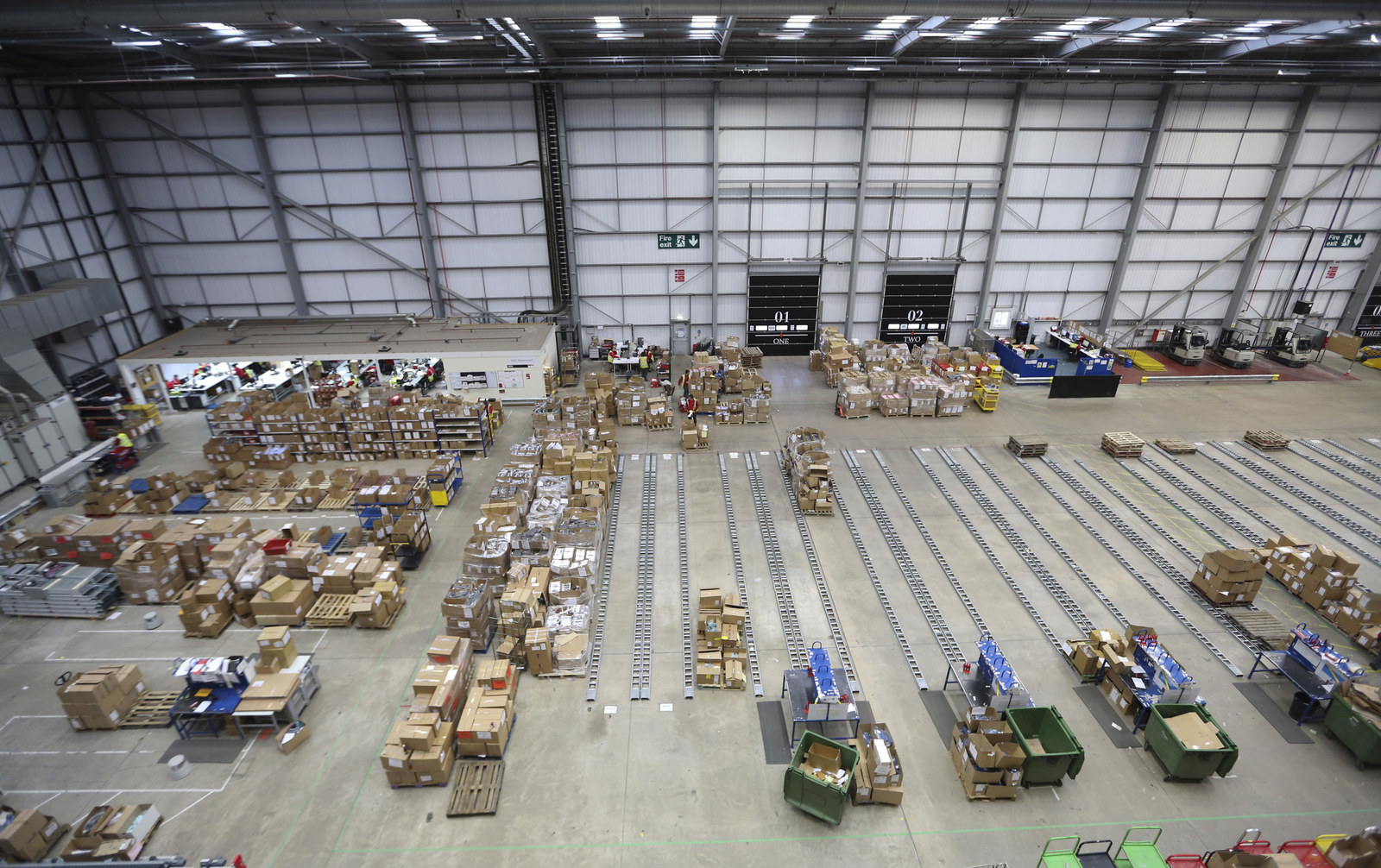
In a three-month investigation, BuzzFeed News interviewed current and former Asos warehouse employees and obtained internal documents, text messages, and phone recordings that lay bare the highly pressurised conditions involved in getting online orders from the company’s central warehouse to customers across the world within 48 hours.
Agency workers and permanent staff say they are saddled with onerous targets to process high volumes of orders each hour, and some say this discourages them from stopping to drink water or use the toilet – and that managers have even recommended they don’t do so towards the end of shifts.
The investigation comes as Asos finds its working practices under increased public scrutiny. Last month Labour MP and party leadership contender Owen Smith criticised the company’s use of flexible working contracts, and the trade union GMB called for the House of Commons business select committee to launch an inquiry into the firm following complaints about working practices at the Grimethorpe warehouse and “invasive monitoring and surveillance” of staff.

It also comes amid growing public concern over the use of flexible contracts following revelations about the treatment of workers by companies such as Sports Direct and Hermes, and protests by Deliveroo riders about pay structure.
BuzzFeed News can reveal that:
Asos managers allegedly live-monitor the number of orders put through the hand scanners used by workers, who can be reprimanded if they fall behind.
Staff say they are unable to take regular toilet breaks or water breaks for fear of missing targets, sometimes at the behest of managers.
Agency staff say they are kept on contracts they believe are exploitative as they allow for them to have assignments ended without notice, to be sent home without pay, or to be told not to come in if management decides to cancel their shift at any time.
Staff on “annualised hours” contracts say their shifts can also be cancelled or extended at short notice under arrangements that allow Asos to “flex up” and “flex down”, and that additional hours have been effectively unpaid with workers being given time off rather than money for time worked.
Workers have allegedly had their assignments ended after falling ill at work or taking time off to care for sick relatives.
Staff allege that security on the site is intrusive and “embarrassing” and that they are sometimes made to remove their shoes for spot checks and searched upon entering the toilets.
Pay is docked if an employee arrives at the warehouse even a single minute late. Workers claim 15 minutes' pay has been docked for just one minute’s lateness.
Global logistics giant XPO, which runs the distribution centre, disputes the allegations. It also says workers are paid for every minute worked and that it works to ensure a "best-in-class and safe working environment".

When Asos brought its supersized warehouse to Grimethorpe, just outside Barnsley, the former coal-mining town found itself the unlikely nexus of a rapidly growing global fashion empire.
Asos founder and former CEO Nick Robertson said in 2008 he wanted the company to be the “Amazon of fashion”, and the business has grown steadily since it was launched in 2000, riding the wave of the online fashion boom to grow from a little-known website to a fashion behemoth spanning 241 markets.
Its success shows no sign of abating either. In the year leading up to 31 August 2015, it hit over £1.15 billion sales. Now the company is targeting £2.5 billion annual sales by 2020, and appetite for its signature brand of fast fashion shows no sign of waning. In the four months to June 2016 alone, Asos’s sales topped £514.6 million, a 30% increase from the same period the year before.
Whether you are in San Francisco, Swansea, or Sydney, a hidden army of people like Joanne Goddard have helped gather the clothes, shoes, and jewellery to be sent around the globe and delivered to your door in two working days. XPO runs the warehouse on behalf of Asos and a company called Transline handles recruitment of agency staff.
To meet consumers’ insatiable demand for fast fashion, the Grimethorpe site operates 24/7; as day-shift workers leave, overnight staff flow in, ready to dispatch orders from 26 miles of walkways.
At the entrance to Asos’s sprawling warehouse there is a giant Transline banner advertising jobs.
Opposite is an advert for the union GMB, which paid £5,000 to position it on the roundabout encouraging Asos staff to sign up for membership.
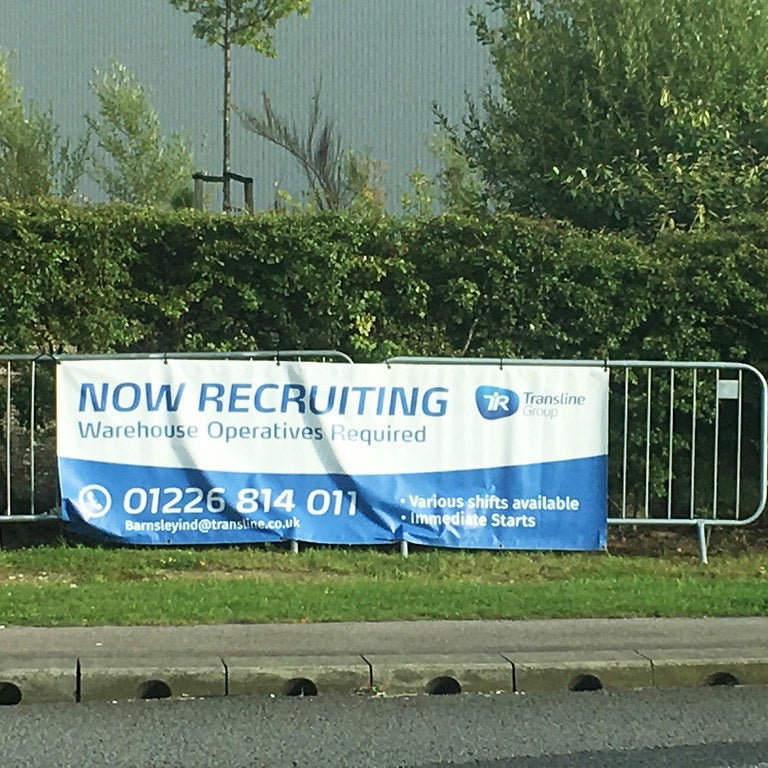

A Transline recruitment banner and an advert for the union GMB
Goddard, like thousands of others from the area, was glad to take a job at Asos.
At first it was “easy money”, the 24-year-old told BuzzFeed News, speaking at her terrace house on a quiet cul-de-sac while caring for her two young daughters, who were excitedly playing with a small black-and-white terrier named Chunk.
The shifts, 3pm to 11pm, were easy for her to fit around childcare, and it was just one bus journey to Asos’s stop, which services the huge inflow of workers from clusters of residential estates nearby, all dressed in red Asos-branded shirts.
Some of the managers would “bend over backwards for you”, she said, and it was a good place to make new friends.
But for Goddard, the easy money soon became hard.
Like other workers who spoke to BuzzFeed News, she said she found herself struggling to hit the hourly performance targets set at the warehouse. XPO told us it had devised these with the help of industry experts.
For pickers like Goddard, this usually meant collecting 160 items an hour to be put together as orders by packers. The targets, she said, were “really hard” to hit, especially when taking into account the time needed for “adding toilet trips, going for water”.
Plus, she added, the hand scanners (aka "handguns") that pickers and packers have attached to their wrists to tell them “where to go and what to pick” across several floors were “constantly breaking”.
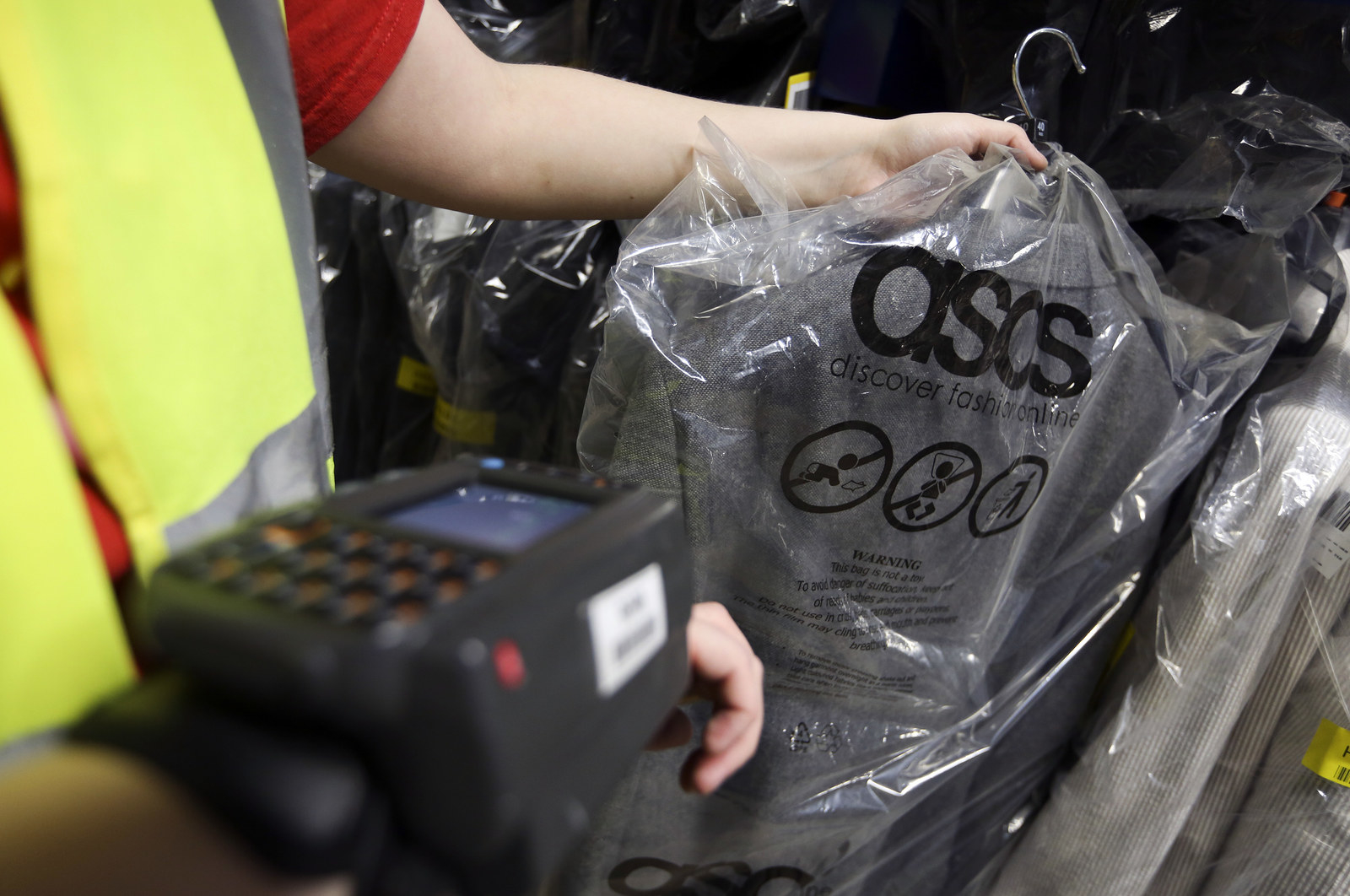
The scanning also enabled management to track the workers' speed. They would take a reading of how many items were being scanned every 15 minutes and make an average for the hour, Goddard said.
“Everything was good to start off with,” she said. But for those who fell behind, as she did, their name would be called over the Tannoy system. “You’d get called to floor three to find out why you haven't met your targets,” she explained.
“Week five I was really, really stressed due to my children being ill and stress from working at Asos," she said. "I still went to work and tried my best.
“At the start of shift we had no handguns. They kept sending us to different places and there were no guns available. Finally at around 3:25pm they finally handed me a gun. Then that gun was constantly crashing so I had to keep restarting.”
XPO, responding on behalf of Asos, told BuzzFeed News that all technical malfunctions were logged so that they did not affect workers’ targets.
But nevertheless, Goddard said that by the time she got a scanner, she was badly behind on her target. She worked as quickly as she could, she said. By break time, she “gave in” and slowed down in the hope she would be sent home.
“I could feel a panic attack coming on,” she said. “I tried to carry on, then it got to 10:30pm and I could tell it was going to be a bad panic attack. I somehow managed to put my gun away.”
The next day she returned “embarrassed” and “on edge”. She carried on working, failing to hit targets, and was called to the third floor. “Not a chance am I running about today after what happened yesterday,” she told the manager.
“I could feel a panic attack coming on ... I could tell it was going to be a bad panic attack.”
Later that week she asked to be moved to a packing role, where "you just stay in the same place all day", and which she felt would be less overwhelming. Alternatively, she asked if she could avoid working on the top two floors where she feared her panic attack might again be triggered.
Her request was supported by a note from her GP, seen by BuzzFeed News, which described her as a patient with a “genuine case of anxiety” who the doctor had seen on multiple occasions. He urged the company to make “reasonable adjustments” to her day to assist her, suggesting that she might be more suited to packing rather than picking.
But instead, Goddard's Transline manager not only refused to move her to a different role or area, he also told her she could no longer do her original picking job as she was “not safe to do the role”.
XPO, responding on behalf of Asos and Transline, denied that an assignment would be ended on the basis of a panic attack. It said that if a colleague were unable to complete a certain role due to health issues, “a reassignment would be offered”.
However, in recordings obtained by BuzzFeed News, the Transline manager can be heard saying they are unable to make adjustments for Goddard and have instead decided to end her assignment following the panic attack.
“Your sick note says you need amended duties and we haven’t got amended duties,” he says. “You don’t feel safe in picking and that’s the role that you’ve got. So what I’ll have to look at doing, Joanne, is ending your assignment on this site.”
The manager offers to contact another Transline office to see whether there are any other jobs in the area. He also says he will call her in future if another Asos job becomes available – a phone call that, Goddard said, has never come.
But Goddard, who cannot drive, explains she needs to be in reach of her two young children and that Asos is suitable because it is a 10-minute journey away.
She then asks if she can go back on to picking to “see how I go”, but the manager repeats that he has nothing to offer her.
“If you do that you’re just going to have another panic attack, aren’t you?” he says.
“Well I could have them any time," Goddard is heard replying. "I’ve had two in the last four days panicking about this because you’re meant to have been ringing me and I don’t know if I’ve lost my job or what. I don’t know what to do.
“I don’t want to be out of my job, definitely not. Shall we just leave it that I’ll go back on pick?”
But the manager informs her she is no longer needed, which Goddard says is unfair.
“What do you mean it’s not fair?” the manager replies. “It’s not fair us continuously keeping you employed if you’re not able to do the role and you’re not safe to do the role.
"It's not fair continuously turning up every day and picking because you're not going to be able to hit your performance [targets] – you're going to be unsure and you're going to cause yourself more harm by having more panic attacks."
The manager adds: "It's not the news you wanted to hear and if I'm being honest it's not the news I wanted to say to you. I wanted to say, 'Yes, I've got this available, let's get you back in tonight,' but I can't, I can't do that.
He concludes: “Unfortunately I can’t continue your employment here because you’re not fit for the role we can offer. I do apologise for that, Joanne.”
Listen to Joanne Goddard's conversation with Transline:

Workers say they have been penalised for sickness or taking time off to care for loved ones
Goddard is not the only worker who has accused Asos of abruptly ending an assignment following sickness.
BuzzFeed News has heard allegations from other former agency workers who said they found their contracts had been terminated following illness or time taken off to care for sick relatives.
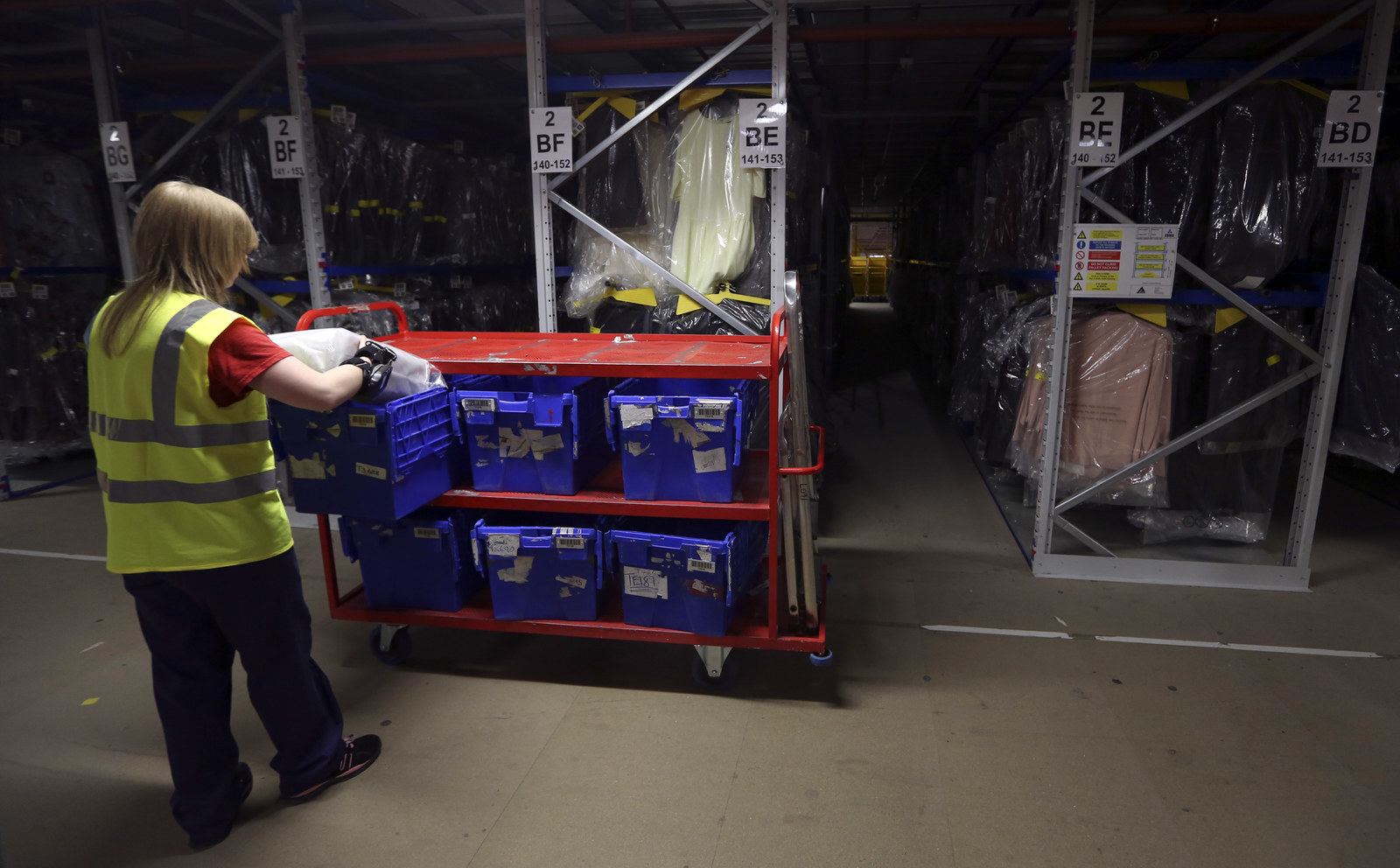
XPO said that while it could not comment on individual cases, it does on occasion terminate assignments when “the length of absence is excessive”, but said absence procedures are “clearly communicated” to all colleagues. It would not, however, clarify what was classed as “excessive” time off.
One former agency worker, who worked for Transline before XPO took over management of the warehouse and who did not wish to be named, claimed they collapsed at work and were taken to hospital, only to return home to a letter informing them their contract had been terminated due to an absence of four days.
Even when the worker returned with discharge papers, they claimed, the management refused to reinstate their job, they told BuzzFeed News.
"There was a letter saying I’d had too much time off and that was it. I went in a few days later to see what the crack was and they just weren’t interested.”
Another former XPO employee, who was not sacked or disciplined, said they took a day off work to care for their sick mother, who had had emergency surgery. They claimed a team leader told them taking time off was “ridiculous” and questioned whether it was necessary.
“That was the day I started looking for another job," they said. "I couldn't look him in the eye ever again.”
Workers interviewed by BuzzFeed News complained about inconsistent management style. “I wish I could name and shame the bad ones, I really do, and name and give credit to the good ones,” Goddard said during her interview.
“That was the day I started looking for another job ... I couldn't look him in the eye ever again.”
Staff, some of whom have worked in the business for several years, said day-to-day experience could vary greatly depending on the managers – who themselves were under pressure to hit targets.
One worker said, “A lot of people are unhappy but they are scared to tell the truth.” Another claimed, “If you try and stick up for yourself then they’ll take it out on you.” XPO, however, said it had democratically elected internal colleague representatives who are available to hear these concerns and that agency workers could discuss them in confidence with Transline’s HR team.
“People are unhappy but they are scared to tell the truth.”
“Management treat people like slaves,” said one current worker. For example, they said, team leaders recommend that workers do not use the toilet or drink water in the last working hour “because the last hour is very important for performance. Even 30 seconds is very important for the company.”
XPO denied this: “Our policy across the site is that people can take toilet and water breaks whenever they want. There are toilet and water facilities within four minutes of every workstation in the warehouse. These breaks are not counted as productive time and therefore do not affect targets.”
The company said it had “anticipated unproductive time” built into its picking and packing targets and that it took into account “comfort breaks, as well as a built-in fatigue factor”.
But workers told BuzzFeed News they found it challenging to fit in bathroom breaks.
“If you cannot do the target, they come to you every hour and say you have to improve it or you will get a performance management meeting with HR,” one person claimed.
Another alleged: “You are literally treated like a machine.”
The comments are mirrored on jobs websites such as Indeed. Even some positive and neutral reviews refer to a “constantly high pace of work” and complain of “a lot of micromanagement” from team leaders.
“You are literally treated like a machine.”
One person, who gave the company a high rating of four stars out of five, said “job security was poor”. Another said “the most enjoyable part was going home”. According to Indeed, one star is the most frequently given rating for Asos warehouse jobs.
Not everyone we spoke to said the targets were impossible. One current employee said they found the targets were generally “achievable”, but criticised the way they were set up to “basically prove” people were always working at all times. He said those who did struggle would “disappear” within a few months.
XPO, however, insisted it had training in place to support workers in achieving targets, and that it would resort to disciplinary or dismissal action only in “extreme circumstances” where training and support had failed.
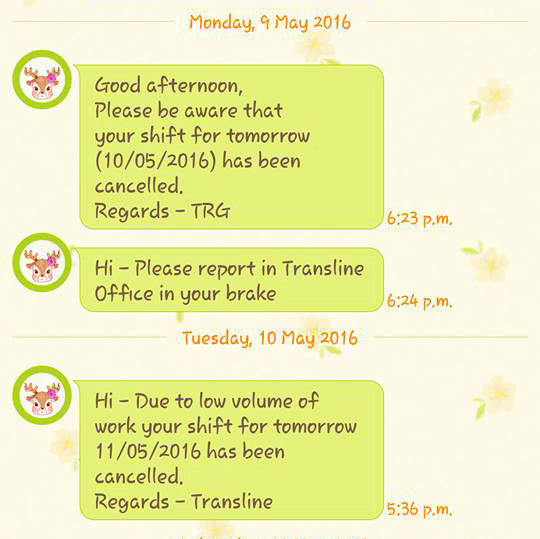
Others also claimed shifts were regularly cancelled at short notice – sometimes, they alleged, when workers had already arrived on site and forked out for the bus fare, which would not be reimbursed. XPO told BuzzFeed News that workers who were already on site when a shift was cancelled had the opportunity to work it.
BuzzFeed News has seen text messages sent to one agency worker by Transline that show the worker’s shifts were cancelled two days in a row.
At 8:41am on the morning of another cancelled shift, the same worker received a further text, which read: “Please ignore the stand down message received yesterday. You ARE expected to work today.”

Employees say their flexible working patterns are good for Asos but not always for them
Asos runs its business reactively. If sales have slowed, it will use email marketing and social media to lure its 12 million customers with tempting promotions and flash sales, which can deliver huge spikes in sales.
Because these promotions are often launched at short notice, demand can be unpredictable.
Asos relies on the flexibility of its workforce in order to meet these kinds of demands, and, as is common in the industry, agency and permanent employees are subject to short-notice changes to their working hours as a result.
For permanent employees, XPO uses a demand-led rostering system known among warehouse staff as “flex”.
Flex requires workers to be available to work (“flex up”) or stand down from a shift (“flex down”) at short notice every other week to help the company cope with fluctuations in sales volumes.
The flex rota is scheduled in advance, and over the year employees are guaranteed to be paid for a set number of contracted hours each month, equivalent to 37.5 hours per week.
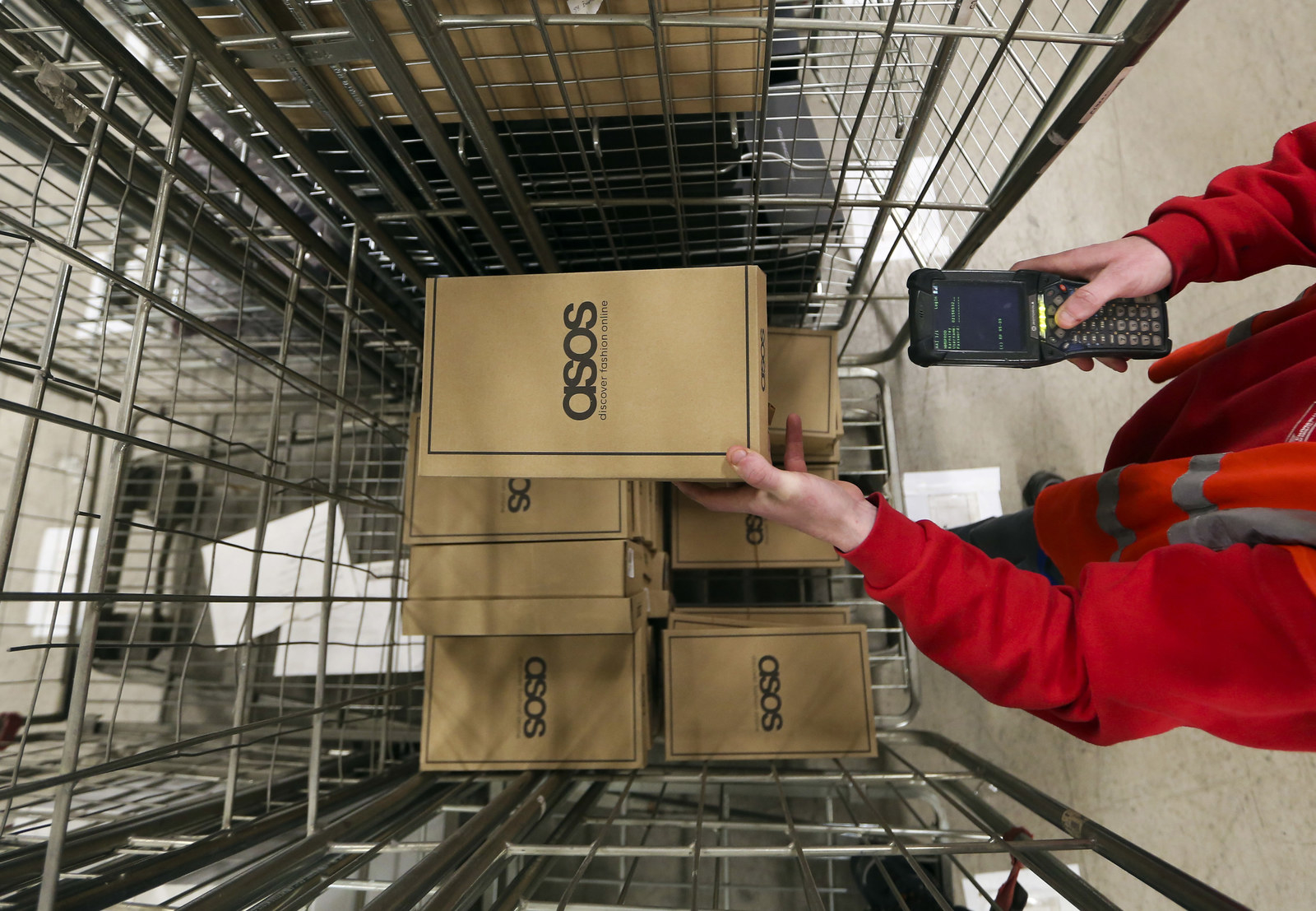
On flex weeks, employees can be flexed up to work an additional 10 hours, set at a maximum of two hours per day, or as part of the contract they can be flexed down if orders are low. They will still be paid the same annualised monthly salary regardless of the hours.
But XPO employees who spoke to BuzzFeed News on the condition of anonymity said the complex system of adjustable working hours enforced by XPO is of far greater benefit to the company than it is to them.
They claim they are “essentially” made to work additional hours in exchange for the possibility of extra holiday days, rather than additional pay. They also claimed to have experienced difficulties when trying to get flex-up hours back.
“You’ve got to come in on your own back, and you’ve got to go home on their favour,” said one staff member. “They make it out to be a gift if you’re flexed down. It works only in one direction, not in the other one,” said another.
A company document seen by BuzzFeed News appears to reveal the uncertainty workers face in taking off accrued time.
It reads that Asos “aims to give these extra hours back throughout the year, however we just can’t guarantee when these days will be”.
Permanent employees also alleged that the company abuses the flexible nature of both its temporary and permanent workforces, to prioritise the reduction of labour costs.
During less busy periods, even when permanent staff have flex hours in the bank, it is more likely that temporary workers will be sent home without pay than permanent employees will be flexed down in order to balance their overtime hours, employees claimed.
Meanwhile, they added, permanent employees will be made to “flex up” before the company will incur the cost of drafting in extra agency workers to meet an increase in demand.
“We will just be standing around saying, ‘Why the hell have we been flexed up and those guys are going home?’” said one person.
Current and former employees also told BuzzFeed News the company required them to flex up more often than it required them to flex down.
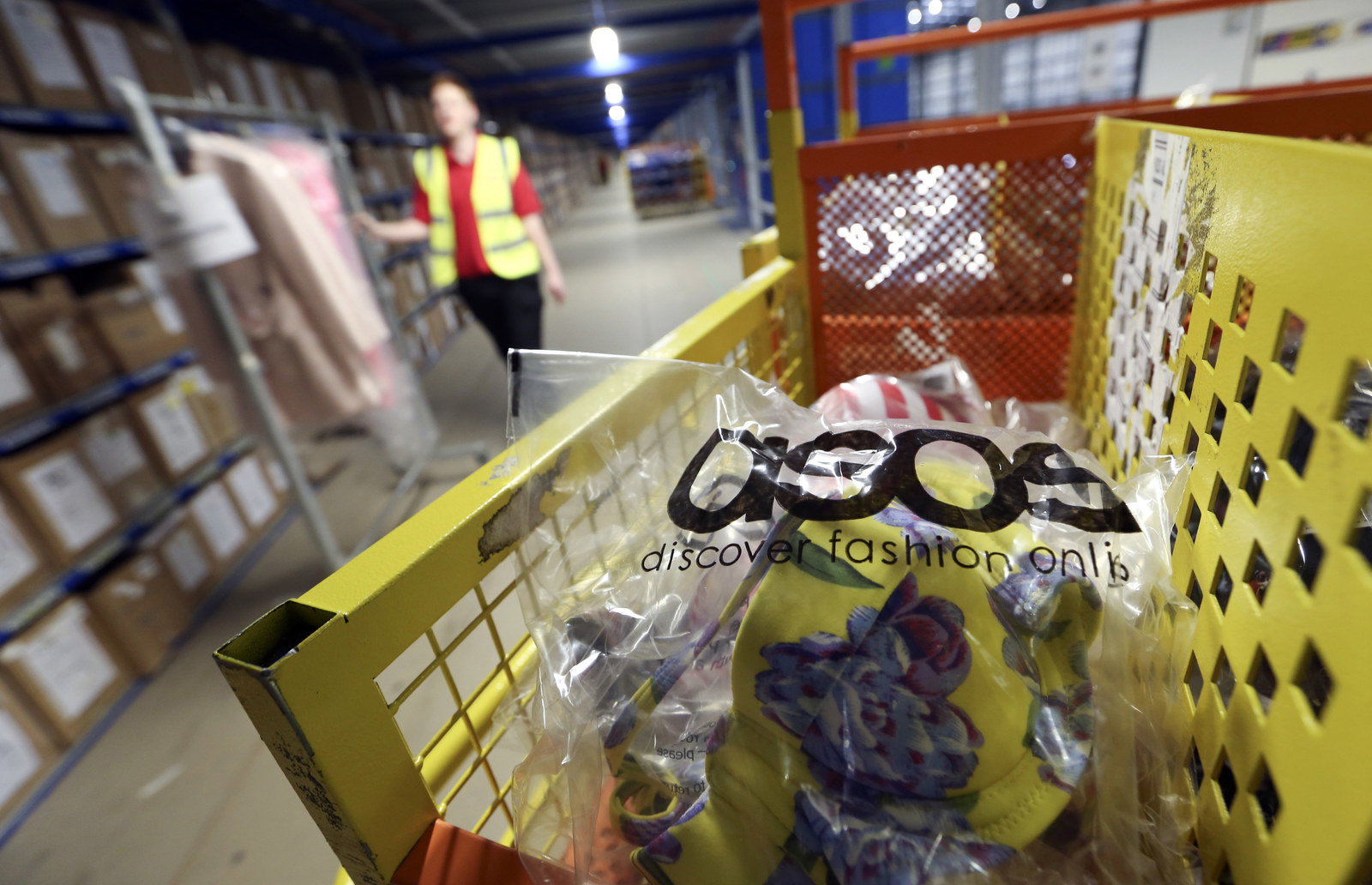
One employee, who claimed to have accrued just under 30 flex-up hours in less than a year, said many of their colleagues had between 40 and 70 hours banked. GMB claimed it had spoken to one worker who was owed 100 hours.
Deanne Ferguson, GMB’s regional organiser for the area, told BuzzFeed News that the union has concerns about this arrangement.
While XPO said it gives employees a minimum of five hours’ notice for flexing up and 24 hours’ notice for flexing down or flexing up on a night shift, Ferguson said she had received reports that people were given only three hours’ notice that they would work longer, a claim XPO denied.
“People have got lives – they don’t work for Asos for their life,” Ferguson said. “They go there to earn their money to have a life. That’s how it should be, but there’s no dignity or respect for the employee at all.” XPO said that workers were given as much notice as possible of flexing up and that the minimum of five hours notice had been used only three times in the last year.
Labour MP Owen Smith recently called XPO’s flex system “one of the worse forms of zero-hours arrangements I’ve come across”, an allegation XPO strongly refuted.
A spokesperson for Acas, an independent organisation specialising in employment disputes, told BuzzFeed News that flexible staffing arrangements like those used at Asos’s warehouse are increasingly popular for businesses led by customer demand, but that “employers need to find a way to balance this need against providing a good working environment for their staff”.
XPO told BuzzFeed News: “In addition to paying above the minimum wage, XPO does not employ anyone in the warehouse on a zero-hours contract. It is a recognised practice across the logistics industry, given the fluctuation in demand, to employ colleagues on an annualised hours contract.”
It said this ensures that “when work is not available” the week’s pay is not affected, because employees are still paid one-twelfth of their annual pay on a monthly basis, whether they have worked their contracted hours, more than their contracted hours, or less than their contracted hours.
When an employee works more than 37.5 hours, XPO’s policy is to give these hours back either by flexing down the employee’s hours down in subsequent weeks, giving time off in lieu or allowing employees to use them as holiday.
The company told BuzzFeed News it reconciled all outstanding hours at the end of each financial year “to ensure there are no hours owed to colleagues or the business”. It would write off any hours owed to the business and pay any hours owed to staff at a “flat rate” at that time. XPO added it was also “moving to a quarterly schedule”.

Workers can be sacked for bringing watches or lipsticks into the warehouse
Current and former workers told BuzzFeed News they feared being sacked for an array of “offences” – including bringing watches, lipstick, or other banned items into the warehouse.
The warehouse has strict disciplinary procedures in place.
Staff are prohibited from having cosmetics, jewellery, watches, and electronic devices including mobile phones – as well as lighters, matches, and cigarettes, which are safety hazards – on them at any time during a shift.
“There is a ZERO TOLERANCE policy in place for the above items entering the warehouse,” one staff notice seen by BuzzFeed News reads. “If you are found to be entering the warehouse with any of these items your assignment will be TERMINATED.”
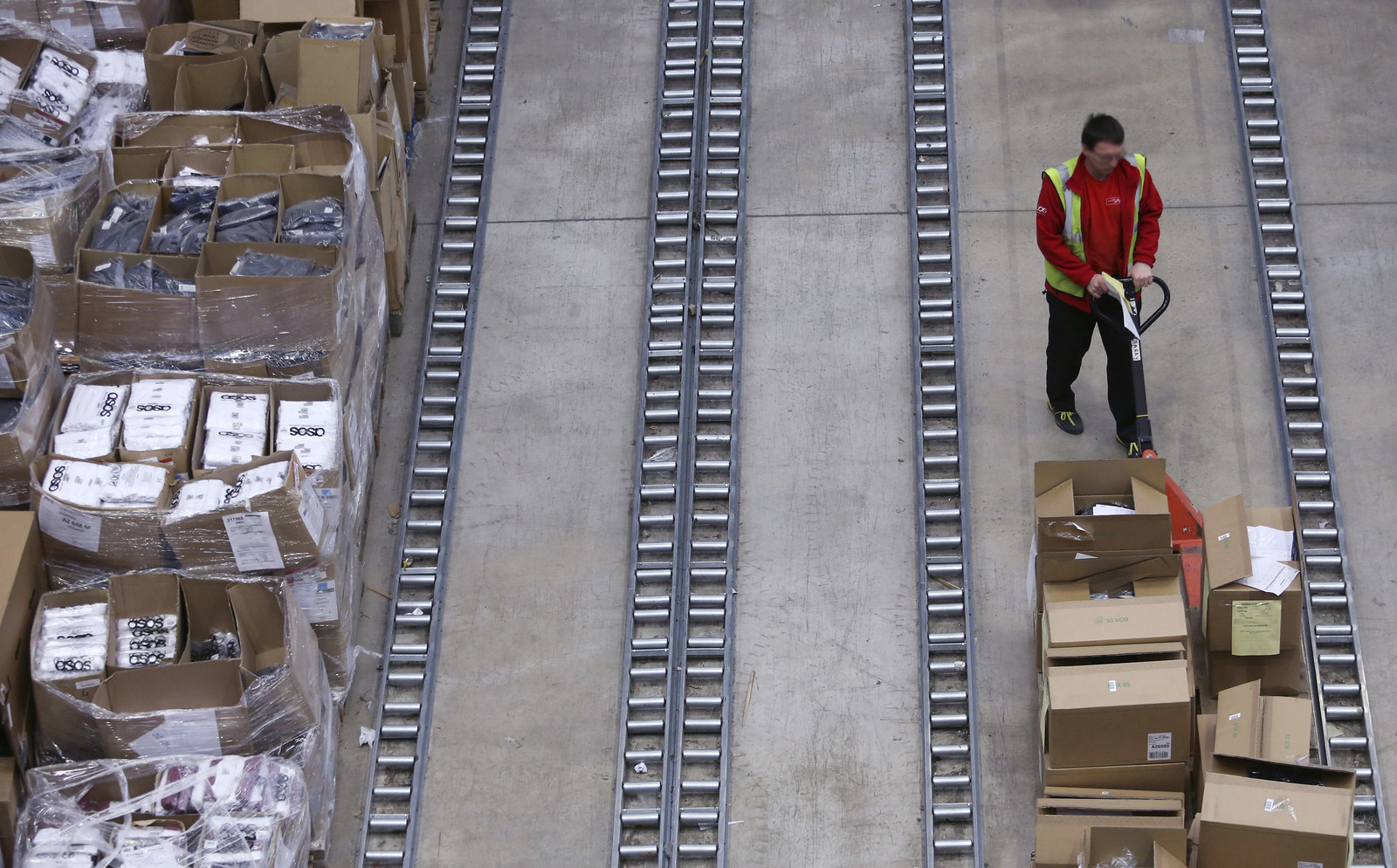
In addition, workers told us they had been docked 15 minutes' pay for clocking in one minute late, or even on the hour. This was despite there being sometimes long queues for workers to enter and exit the warehouse because of security checks as staff pass through the turnstiles, they claimed.
BuzzFeed News calculated that, based on 15 minutes being deducted on Asos’s standard hourly wage of £7.45 per hour, workers could be paid less than the minimum wage for that hour, at £5.59 for 59 minutes' work.
One employee told us that around the time Sports Direct CEO Mike Ashley faced questions over pay-docking for lateness, Asos reduced the amount of pay it would dock for one minute’s lateness.
BuzzFeed News has seen a pay slip that appears to show “0.25 hours” deducted for what the employee claims was one minute's lateness earlier this year. XPO confirmed it does apply deductions but said: “Our colleagues are paid for every minute they work.” The company declined to specify whether the policy had changed recently.
Other gross-misconduct offences include criticising Asos on social media, but workers can also be fired for an accumulation of warnings for lesser offences – including failing to follow reasonable instructions and being absent from work without permission.
Typically, dismissal follows a verbal warning, a first written warning, and a final written warning, a handbook dated 2013 outlines, but agency workers said they could be dismissed with or without notice, following just a verbal warning.
XPO told BuzzFeed News “all new colleagues are managed to the same policies as colleagues who have a longer period of service” but declined to specify whether it had updated its policy, or to share a copy of it.
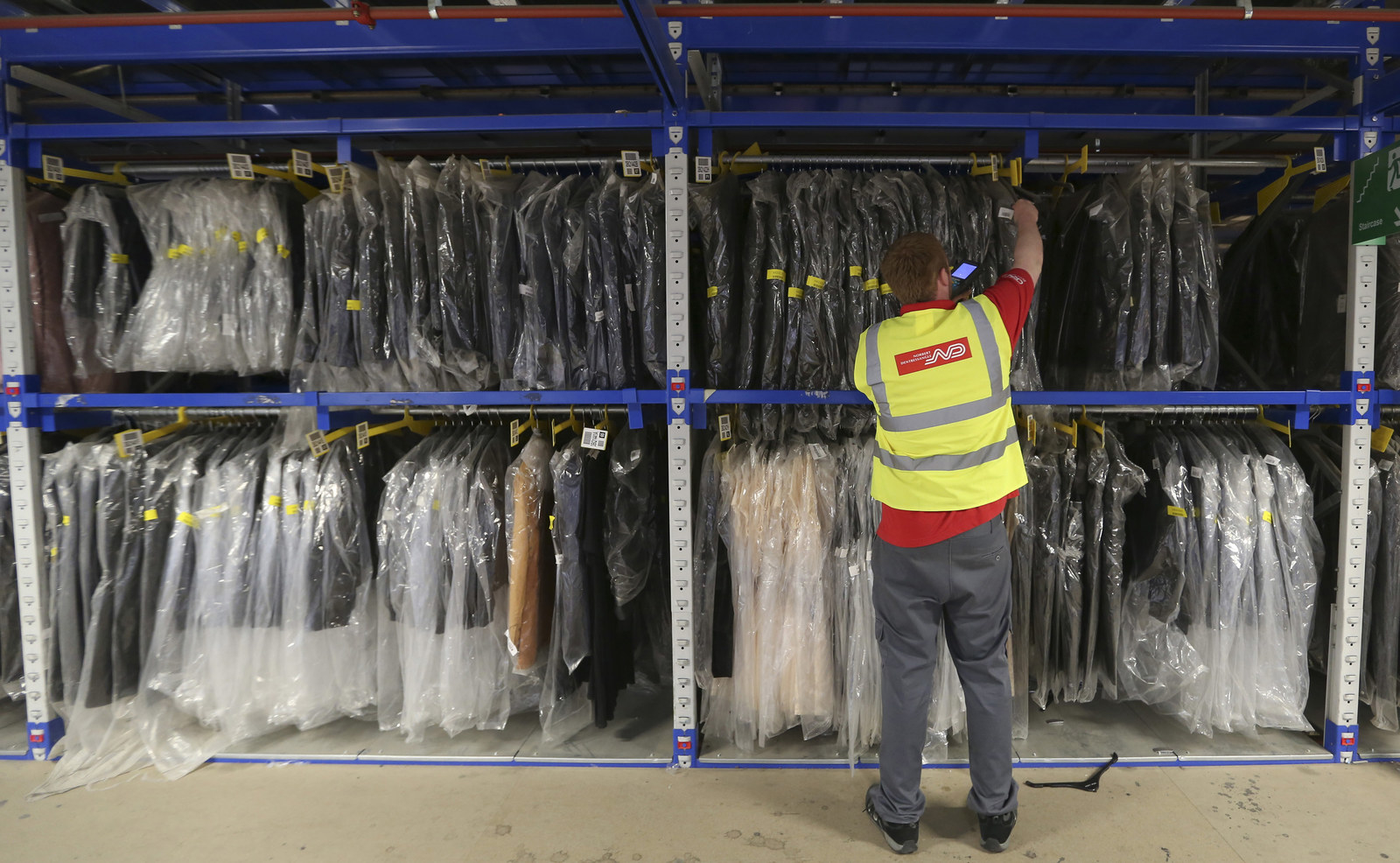
The company's spokesperson did, however, insist its workers receive its disciplinary and misconduct policy and “so are clear on the behaviours required on site to create a great place to work for all”.
Workers described how there were delays on exit from the warehouse after they clocked out of a shift. XPO confirmed to BuzzFeed News it could take “several” minutes for a worker to exit the site and that it was investing in reducing this time.
Workers said this was a problem because they weren't paid for all the time on site and they were penalised for lateness.
XPO declined to confirm the details of its pay deduction policy, but said: “Minute deductions are in place for lateness and this has been communicated to all colleagues. Whatever the circumstances, we pay above the national minimum wage for all colleagues.”

Staff say they are treated like thieves and subjected to invasive random security checks
Asos’s warehouse has a historical issue with theft, some employees claimed, and as a result uses extensive CCTV to monitor staff. Staff are also subject to random searches by security personnel during shifts, when visiting bathrooms, and on entering and exiting the building. Searches on the way in and out of the warehouse can involve airport-style body scanners.
The most expensive items in the warehouse are guarded by security on site and can be handled only by staff with a Criminal Records Bureau certificate.
XPO told us that it reserves the right to search staff with “just cause” and that this term is included in employees' contracts, as is common in the logistics industry. But while employees we spoke to did admit they agreed that disaffected workers had stolen from the company in the past, they felt like a culture of suspicion had been created by over-extensive security measures.
“We are all being treated like thieves, from the start and all the time,” one employee told us. “Higher management and HR seem to say, ‘We’ve got 4,000 employees so probably we’ve got 4,000 thieves.’”
Random security checks on site are mandatory for all staff and extend to both cars and personal lockers. Searches on the way in and out of the building are conducted in staff members’ own time – before and after they clock in and out.
“Higher management and HR seem to say, ‘We’ve got 4,000 employees so probably we’ve got 4,000 thieves.’”
The GMB union told us it had represented one member who was suspended for being obstructive after she refused to let security guards search her car until she had finished eating her lunch. XPO confirmed to BuzzFeed News it had subsequently apologised to the employee and she was able to return to work with no further disciplinary action.
During random spot-check searches inside the warehouse, staff can be asked to remove their shoes. One employee who has worked for the company for around two years told us these searches are “embarrassing”.
“They walk over and tell you, ‘This is a random search,’ but it feels like they just have their eye on you,” he said.
A spokesperson for XPO confirmed it does carry out security checks: “We do randomly search a very small percentage of our colleagues and an even smaller percentage of colleagues are asked to remove their boots.” But they added: “We do not discriminate, but we must ensure we mitigate risk where possible.”
Internal documents also show that workers are subjected to Breathalyser tests after any injuries or health and safety incidents, big or small – in one instance for a cut finger, one former worker claimed. They can also be subjected to both alcohol and drugs testing at random.

Those who work at the warehouse want things to change
After the Grimethorpe Pit closed in 1993, as the British coal-mining industry entered its final death throes, the area was plunged into deep unemployment, and more than 50% of the town’s population were without a job for the rest of the decade. The European Union’s 1994 study of deprivation declared Grimethorpe the poorest place in the UK.
A supercharged injection of jobs with a rapidly growing business should have been a godsend for the many people who went to work for Asos. But for many the working environment and lack of job security for agency workers has been a huge disappointment.
“I don’t know anybody who hasn’t worked there themselves or had a brother, cousin, partner, or son working there who has come out with a positive impression," one former agency worker told us. "It’s always been the same.”
But in a statement to BuzzFeed News, XPO, which runs the Grimethorpe site on behalf of Asos, defended the working practices there.
XPO supply-chain account director Ken Perritt said the company “works directly with our colleagues to ensure a best-in-class and safe working environment” and has an independently elected colleague forum “for this purpose”.
He added: “It is a recognised practice across the logistics industry, given the fluctuations in demand, to employ colleagues on an annualised hours contract.
“We believe that the best way to continually improve the working environment is to collaborate directly with our colleagues.”
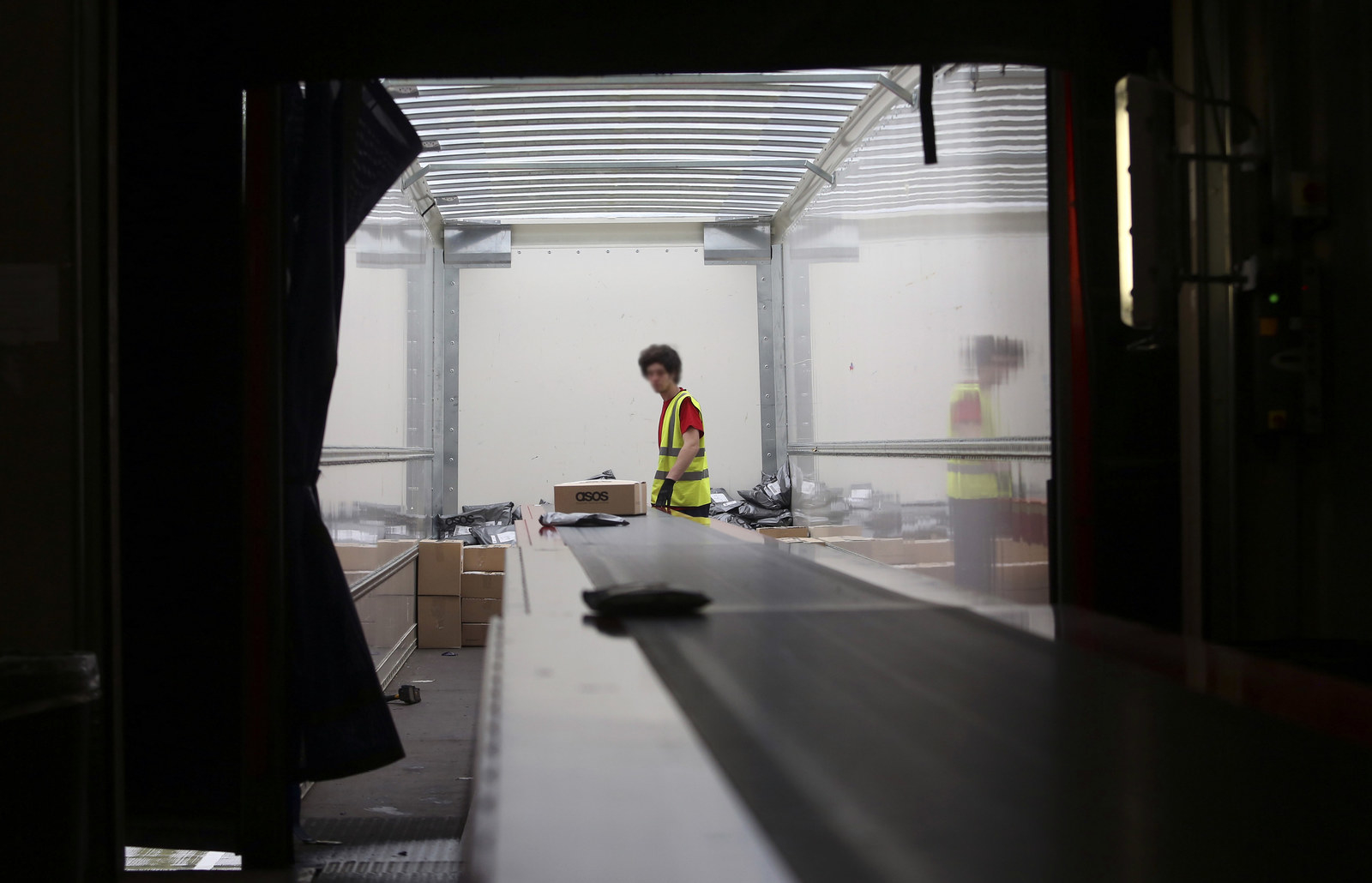
An Asos spokesperson said: “We take employment incredibly seriously and continue to say very clearly that what continues to be thrown at us is simply not true – we don’t use zero-hours contracts, we pay above minimum wage, people can take toilet and water breaks whenever they want (and no that time doesn’t count against their performance targets).
“However, these stories continue to get written, and without mention of the investment that has been made in facilities at the site, the wide range of benefits we provide for our staff there, or the democratically elected Employee Forum that was set up to represent the workforce.”
The company added it had invested £81 million in the site since 2011, was awarded the Gold Standard for wellbeing by Barnsley Council in 2014, had multiple training schemes, and had created 567 new jobs over the past two years. It also ran a paid apprenticeship programme in conjunction with Barnsley College, it said.
The company also dismissed Owen Smith’s call for an inquiry into Asos’s treatment of its warehouse staff.
An Asos spokesperson said they “were surprised to see these allegations from Owen, given that it was the first we had heard from him and he’s never been inside the warehouse”.
When accusations of poor working conditions at Asos’s warehouse have surfaced in the past, the company has been quick to bat them away as the complaints of a few disgruntled staff.
But GMB's Deanne Ferguson said: “I say to people when they get a job at Asos that they’ve left their ambitions at the door, because you go in and you’re worked like a robot. Transline are churning out workers like you would not believe. There are hundreds of hundreds of people in that place – thousands – and they’re just not treated fairly.”
Those who have been inside the warehouse agree. “When you’re sat around people there you hear some awful stories about the place and hardly ever any good ones,” Joanne Goddard said. “Most people hated it but some were just like, ‘Don’t think about it, just think about the money.’”
Current workers who spoke to BuzzFeed News on the condition of anonymity were worried about telling their stories but hoped they could make a difference inside.
“Too much goes on behind these walls that affects people in different ways,” one worker said. “Nothing will change without us speaking out.”


